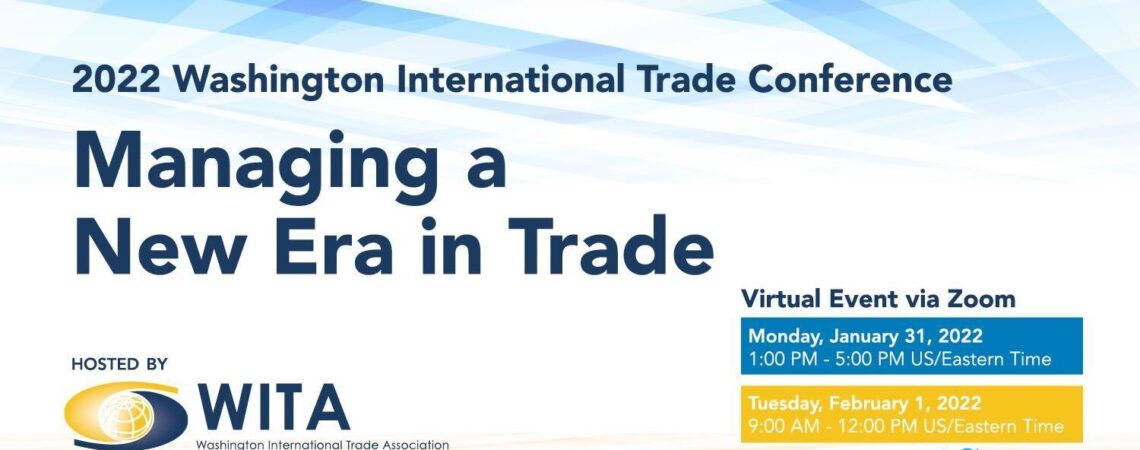On Monday, January 31st, and Tuesday, February 1st, 2022, WITA hosted its fourth annual Washington International Trade Conference (WITC). This conference brought together leaders in international trade from across the U.S. and around the world to explore the trade landscape and look toward the future of trade.
-

Fireside Chat with the OECD Secretary General - 2022 WITC
-

How Trade and Trade Policies Can Help Achieve Climate Goals - 2022 WITC
-

Armchair Discussion with the Deputy Director General of the WTO - 2022 WITC
-

US-China Strategic and Trade Relations - 2022 WITC
-

Ambassadors Roundtable: Working with Allies and Partners - 2022 WITC
-

Strengthening the U.S. Economy and American Jobs Through Trade - 2022 WITC
-

Solving Supply Chain Disruptions - 2022 WITC
-

Closing Plenary with Ambassador Sarah Bianchi, Deputy U.S. Trade Representative - 2022 WITC
-

Day 1 - 2022 Washington International Trade Conference
-

Day 2 - 2022 Washington International Trade Conference
Secretary-General Mathias Cormann, Organization for Economic Co-operation and Development (OECD)
Moderator: Ambassador Kristen Silverberg, President & COO, Business Roundtable; former U.S. Ambassador to the European Union
Aik Hoe Lim, Director, Trade and Environment Division, World Trade Organization
Kelly K. Milton, Assistant U.S. Trade Representative, Environment and Natural Resources
Ambassador Gloria Abraham Peralta, Costa Rica’s Permanent Representative to the World Trade Organization, Co-Chair, Trade and Environmental Sustainability Structured Discussions (TESSD), World Trade Organization
Moderator: Sarah Stewart, Executive Director, Silverado Policy Accelerator; former Deputy Assistant U.S. Trade Representative, Environment and Natural Resources
Angela Ellard, Deputy Director General, World Trade Organization
Moderator: Ambassador Rufus Yerxa, former Deputy U.S. Trade Representative; former Deputy Director General of the World Trade Organization
Amy P. Celico, Principal Albright Stonebridge Group | Dentons Global Advisors; former Senior Director for China Affairs, Office of the U.S. Trade Representative
Wendy Cutler, Vice President, Asia Society Policy Institute; former Acting Deputy U.S. Trade Representative
Bonnie Glaser, Director of the Asia Program, German Marshall Fund of the United States
Samm Sacks, Senior Fellow, Paul Tsai China Center & New America, Yale Law School
Moderator: Erin Ennis, Vice President, Global Public Policy, Dell Technologies
Ambassador Kirsten Hillman, Canadian Ambassador to the United States
Ambassador Tomita Koji, Japanese Ambassador to the United States
Ambassador Stavros Lambrinidis, European Union Ambassador to the United States
Moderator: Ambassador Susan Schwab, Strategic Advisor, Mayer Brown LLP; former U.S. Trade Representative
Orit Frenkel, CEO, American Leadership Initiative
Ed Gresser, Vice President and Director for Trade and Global Markets, Progressive Policy Institute (PPI)
Jeffrey Kucik, Associate Professor, School of Government and Public Policy at University of Arizona
Chad Thompson, Executive Director for Legal Affairs & Trade, General Motors
Moderator: Sarah Thorn, Senior Director of Global Government Affairs, Walmart
Jon Gold, Vice President of Supply Chain and Customs Policy, National Retail Federation
Phil Levy, Chief Economist, Flexport
Penny Naas, President of International Public Affairs and Sustainability, UPS
Maria Zieba, Assistant Vice President of International Affairs, National Pork Producers Council
Moderator: Ana Swanson, Correspondent, New York Times
Ambassador Sarah Bianchi, Deputy U.S. Trade Representative
Moderator: Ambassador Robert Holleyman, Partner & President & CEO, Crowell & Moring LLP and C&M International; Former Deputy U.S. Trade Representative











